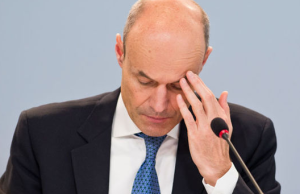EUROPE’S BIGGEST ECONOMY PLUNGED INTO CHAOS THIS WEEK WITH WARNINGS THAT GERMANY’S FINANCIAL CRISIS COULD DESTROY THE ENTIRE EUROPEAN UNION. THE COUNTRY REPORTEDLY LOST £14,292,610,000 BILLION (ABOUT $20.8 BILLION IN USD) IN THE PAST THREE MONTHS.
Fear struck local markets as shares in Commerzbank and Deutsche Bank – the country’s two biggest lenders – plummeted again. Deutsche Bank lost 4%, hitting an all-time low reminiscent of the financial crisis of 2009. Commerzbank fell by nearly 5%, closing at the lowest level the company has seen in over two years.

Pictured at left is Marcus Schenck, CFO of Deutsche Bank. Last week, the bank reported record losses of more than £5.1 billion, enough to incite a panicked wave of selling. The news was paralleled by another stock market crash on Tuesday that took billions from big banks in the UK.
Germany is the planet’s fourth biggest economy. Experts agree that the fate of the entire Eurozone relies on its financial security.
“The reliance of the Eurozone on the Germany economy, bolstered by its strong banking system, is more pronounced than many would expect,” said Andy Baldwin of Ernst & Young. “The short term health of economies including France, Italy, and Spain is dependent on the continued growth of the German economy – a major component of which is the further strengthening of its banking sector.”
Meanwhile, Barclays has closed down 5%, Standard Charted nearly 6%, and HSBC, RBS, and Lloyds about 4%. The Swiss bank UBS has also slumped, plummeting almost 7% after reporting an unexpected outflow of funds from its primary wealth management business.
The FTSE 100 Index saw nearly 3% wiped from its value. BP is struggling with the biggest daily declines since the disaster in the Gulf of Mexico and annual losses worse than anything in the past two decades. BP also announced massive job cuts, leaving thousands of workers unemployed.
“BP’s dividend is a mile away from being covered by earnings and the market is saying that this is unsustainable,” explained equities researcher Steve Clayton of Hargreaves Lansdown. “They are a chasm away from their cash break-even oil price of around $60 dollars per barrel.”
Europe’s oil and gas sector is looking grim:
• The FTSEurofirst index dropped 2% and is down almost 7% compared to last December
• STOXX Europe 600 Oil and Gas index fell 4.8%
• Brent oil dropped more than 5%
• Shares in Royal Dutch, Shell, Total, Eni, and Reposol fell between 4% and 5%
• BHP Billiton dropped by almost 7%
The US stock market doesn’t look much better, with the DJIA down by more than 300 points in morning trading.
“We still haven’t broken the correlation between oil and equities and we are yet to find a bottom in oil prices,” said Jeff Carbone, a co-founder of Cornerstone Financial Partners. Consumer savings from inexpensive gasoline have not translated into higher spending, he added.
Source:
http://financialfreedominsider.com/2016/03/german-banks-lose-nearly-21-billion-in-90-days/
Germany is the planet’s fourth biggest economy. Experts agree that the fate of the entire Eurozone relies on its financial security.
“The reliance of the Eurozone on the Germany economy, bolstered by its strong banking system, is more pronounced than many would expect,” said Andy Baldwin of Ernst & Young. “The short term health of economies including France, Italy, and Spain is dependent on the continued growth of the German economy – a major component of which is the further strengthening of its banking sector.”
Meanwhile, Barclays has closed down 5%, Standard Charted nearly 6%, and HSBC, RBS, and Lloyds about 4%. The Swiss bank UBS has also slumped, plummeting almost 7% after reporting an unexpected outflow of funds from its primary wealth management business.
The FTSE 100 Index saw nearly 3% wiped from its value. BP is struggling with the biggest daily declines since the disaster in the Gulf of Mexico and annual losses worse than anything in the past two decades. BP also announced massive job cuts, leaving thousands of workers unemployed.
“BP’s dividend is a mile away from being covered by earnings and the market is saying that this is unsustainable,” explained equities researcher Steve Clayton of Hargreaves Lansdown. “They are a chasm away from their cash break-even oil price of around $60 dollars per barrel.”
Europe’s oil and gas sector is looking grim:
• The FTSEurofirst index dropped 2% and is down almost 7% compared to last December
• STOXX Europe 600 Oil and Gas index fell 4.8%
• Brent oil dropped more than 5%
• Shares in Royal Dutch, Shell, Total, Eni, and Reposol fell between 4% and 5%
• BHP Billiton dropped by almost 7%
The US stock market doesn’t look much better, with the DJIA down by more than 300 points in morning trading.
“We still haven’t broken the correlation between oil and equities and we are yet to find a bottom in oil prices,” said Jeff Carbone, a co-founder of Cornerstone Financial Partners. Consumer savings from inexpensive gasoline have not translated into higher spending, he added.
Source:
http://financialfreedominsider.com/2016/03/german-banks-lose-nearly-21-billion-in-90-days/

.jpg)

Post a Comment